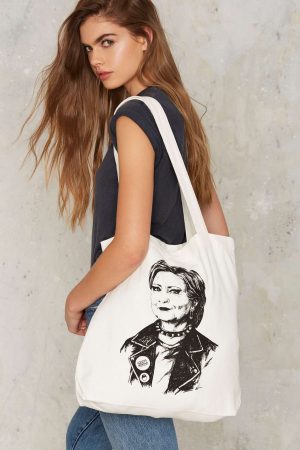There’s a trademark rumble a’ brewin’.
No one will soon forget Donald Trump’s unprovoked insult of Hillary Clinton, during the third presidential debate, when he called her a “nasty woman.” That insult spurred a cottage industry of merchandise, as women took the insult as a battle cry — one they were proud to show off.
#NastyWoman Samantha Bee: Trump "confused abortions with bear attacks." VIDEO: https://t.co/2OZyCx3ek8 pic.twitter.com/hCW86zUMTp
— The Daily Beast (@thedailybeast) October 25, 2016

Transform Legal Reasoning Into Business-Ready Results With General AI
Protégé™ General AI is fundamentally changing how legal professionals use AI in their everyday practice.
Katy Perry is a #nastywoman — at least for Hillary Clinton. https://t.co/YEjRMiaYjn
— USA TODAY (@USATODAY) October 25, 2016
Mood.
Get your #NastyWoman shirt here ➝ https://t.co/HhJdPYibmC pic.twitter.com/tAL0Rpj4Pi
— Texas Democrats (@texasdemocrats) October 23, 2016

Heading To Legalweek? Come Join Above The Law!
Meet the team in NYC at our Monday night happy hour — 3/9 at 7pm. RSVP required.
But there may be a legal battle in the works over the right to market those shirts. As The Fashion Law reports:
[O]n the evening of the debate, [Mike] Lin filed an application for registration on behalf of his company, 47 / 72, for the “Nasty Woman” mark with the U.S. Patent and Trademark Office (“USPTO”) for use in connection with “On-line retail store services featuring clothing, posters, pillows, mugs, bags, and mobile electronics cases and covers.”
And, yes, it has been more than just Lin trying to make a buck off of Nasty Woman merch. And, according to an interview with TMZ, he is planning on going after the imposters.

Picture by Nasty Gal
But Lin’s claim isn’t cut and dried. Among the other retailers making money off of Trump’s insult is Nasty Gal, with a “nasty woman” rendering of Hillary in biker gear. And the similarity between the Nasty Gal branding and “nasty woman” just might end the fight:
Nasty Gal might actually be in the clear here. As the USPTO notes in its “Basic Facts” trademark primer, “marks [that] convey a similar general meaning and produce the same mental reaction” – such as “City Woman” versus “City Girl,” an example the USPTO lists – will be deemed similar and thus, the secondary mark may not be eligible for registration with the USPTO. Since Nasty Gal already has an array of registrations for its “Nasty Gal” mark that long pre-date Lin’s usage of the “Nasty Woman” mark, including one for online retail services, it might be impossible for Lin to successfully sue the brand for infringement and also to register its “Nasty Woman” mark altogether.
But that hasn’t stopped Lin from trying. He claims he wants to use the takedown procedure of the Digital Millennium Copyright Act (“DMCA”) to assist him in his quest. But he is claiming trademark infringement, not copyright infringement — which is what the DCMA covers — so this might not be the remedy Lin is looking for.
Kathryn Rubino is an editor at Above the Law. Feel free to email her with any tips, questions, or comments and follow her on Twitter (@Kathryn1).